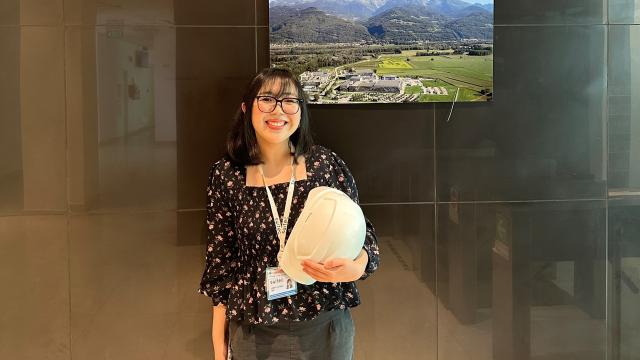A mysterious explosion had occurred in a biological lab, causing a biohazardous leakage. A professor working nearby is exposed to a high concentration of the reagents, and is suffering from its effects. Year Three Pharmaceutical Engineering student Calvin Ho Kwok Weng and his team are tasked to solve the mystery by apprehending the culprit behind the explosion within 60 minutes.
Prior to the start of the investigation, Calvin and his team are presented with important documents which might shed light on the case. However, the documents are all password-protected. Calvin needs to solve a series of questions using knowledge in bioprocess engineering, in order to derive the passwords and unlock the documents.

Calvin (seated in white shirt) and his team mates attempting the EDscape Assessment.
Escape Assessment is a live-action team-based game where participants are tasked to solve puzzles in order to escape from an enclosed area or achieve a certain goal. At the Singapore Institute of Technology (SIT), this novel game concept is borrowed to appraise students’ academic learning and character development through a gamified experience aptly named the ‘EDscape Assessment’.
“It was much more than just fun – it was immersive and thought provoking!” Calvin relates. “We tend to remember hands-on experiences for a longer period of time, and the EDscape Assessment was completely engaging.”
While Calvin admits that it is easy to get frustrated during the game due to the anxiety and time pressure, the experience is ultimately rewarding. “I recall checking our calculation multiple times but the system did not accept our answer. After numerous tries, we discovered that it was due to incorrect formatting. Needless to say, our virtual assistant received a good lashing for being unhelpful,” he grins.
Compared to individual grading, Calvin believes that students are more motivated to do well in a group setting. “When sitting in an examination hall, there is a lot of internal rationalising. For the EDscape Assessment however, the rationalisation is externalised and everyone gave their fullest participation. Such a team-based approach to solving obstacles is much more applicable in the real world.”

Students trying to solve puzzles as part of the EDscape Assessment gamified experience.
Gamification in Education
Schools are realising the potential of gamification in education. As intrinsically rewarding and motivational activities, games have the ability to pique students’ interest and inject an element of fun. Similarly at SIT, educators are constantly pushing the boundaries to develop new and exciting learning tools.
“The EDscape Assessment is designed to provide a relatable and immersive experience for students,” explains Assistant Professor Lim Kaiyang, Chemical Engineering and Food Technology Cluster, SIT. “Each element, from the theme, to the videos and props, works synergistically to create a comprehensive story, in order to connect the gameplay to the subject matter.”
“In today’s learning environment, content knowledge is no longer enough as students can easily search for information on the web,” he opines. “Instead, what is far more valuable is how the knowledge is applied. By supplementing pen-and-paper examinations with the EDscape Assessment, we are able to effectively assess what students know and how they work with the knowledge.”
Prior to the introduction of EDscape Assessment in SIT’s curriculum, Asst Prof Lim and his team comprising Clarice Lee, Educational Media Producer, Sherlyn Tan, Profesional Officer, and Miriam Wun, Learning Designer, piloted two trials. One was conducted as a mid-semester review for five Year Three Chemical Engineering students, while the other was conducted for 40 Year Two Pharmaceutical Engineering students.
“During the pilot, we observed high levels of engagement, as well as good demonstration of critical thinking and teamwork among students,” Asst Prof Lim shares. “Students commented that the games were fun, innovative and enriching. This gave us the confidence to extend the benefits of EDscape Assessment to the entire cohort.”
In fact, Asst Prof Lim views the EDscape Assessment as an opportunity for students to hone interpersonal skills such as teamwork and communication. “It prepares them for entry into the workforce, where students will need to collaborate and communicate with others, integrate and evaluate information, as well as effectively couple knowledge with technology to solve real-world problems.”

Students’ interest in otherwise dry topics such as Heat Exchanger are sparked through gameplay.
By infusing fun and the concept of play, SIT has sparked student interest in otherwise dry topics such as Bioprocess Engineering and Heat Exchanger Design and Rating. “We were surprised by our students as they became very eager to find out the answers to the puzzles they missed. This makes the EDscape Assessment an effective form of formative assessment, and provides the impetus for students to develop a deeper understanding of the subject matter.”
The series of successful EDscape Assessment runs has given Asst Prof Lim and his team the confidence to further enhance the programme. As part of SIT’s digitalisation initiative, the team is leveraging artificial intelligence by replacing human facilitators with the Google Home Mini. This would provide quick answers on gameplay-related questions in a timely manner, while easing the burden on educators. Soon, students can also look forward to new, enriching EDscape Assessment experiences that are supported by the use of augmented reality.
The case study on ‘Development of EDscape Assessment: An All-encompassing, Gamified Assessment System that Evaluates Students' Subject Literacy and Development of 21st Century Skillset' was featured in the book 'Applied Learning in Higher Education: Perspectives, Pedagogy, and Practice'. The book is available for purchase online from Informing Science Press, Amazon, and Google Play.
![[FA] SIT One SITizen Alumni Initiative_Web banner_1244px x 688px.jpg](/sites/default/files/2024-12/%5BFA%5D%20%20SIT%20One%20SITizen%20Alumni%20Initiative_Web%20banner_1244px%20x%20688px.jpg)


